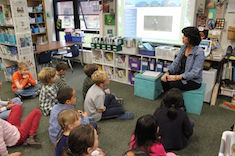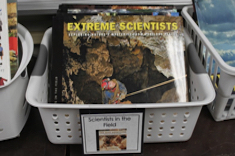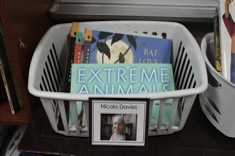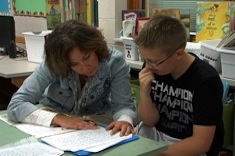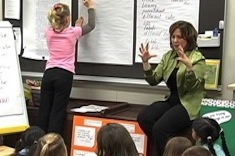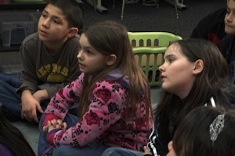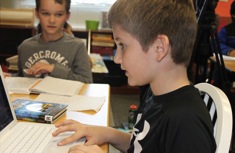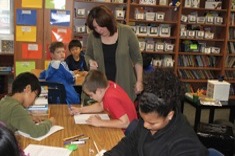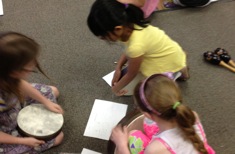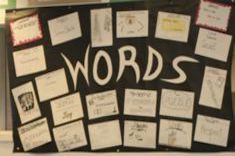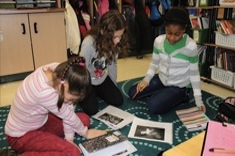3rd
Latest Content
Jennifer Serravallo on Formative Assessment (PODCAST)
Franki Sibberson chats with Jennifer Serravallo about formative assessment in this podcast. Jennifer is the author of The Literacy Teacher’s Playbook, Grades 3-6: Four Steps for Turning Assessment Data into Goal-Directed Instruction.
Formative Spelling Assessment
Max Brand has developed templates for grades K-2 and 3-5 to use for formative spelling assessments.
Keep Going
Ruth Ayres has advice for moving forward, staying positive, and focusing on what’s important.
Rethinking Nonfiction Topic-Based Text Sets
Franki Sibberson concludes her series on redesigning nonfiction sections of classroom libraries in the age of the Common Core.
Rethinking Nonfiction Series Books
Franki Sibberson explains how she features nonfiction series books in her classroom library.
Rethinking Nonfiction Author Baskets
Franki Sibberson realizes she needs to highlight nonfiction authors in new ways in her classroom library.
Explanatory Grammar Moves: Right-Branching Sentences
Jeff Anderson continues his Explanatory Grammar Series with a feature on the power of right-branching sentences.
Spelling Cycles: An Alternative to Weekly Spelling Lists
Max Brand developed Spelling Cycles as an alternative to weekly spelling tests. He explains how they work with an example from a third-grade class.
Curating a Nonfiction Classroom Library
Franki Sibberson writes about how her thinking about nonfiction is changing her classroom library in this first installment of a four-part series.
Powerful Conferences
Ruth Ayres explains how deciding the purpose of conferring in advance can lead to more powerful conferences.
Two Lessons for Teaching Theme
Franki Sibberson writes about how she chooses books for theme instruction and shares two lessons.
Finding a Writing Buddy
Beth Lawson helps her fourth graders sort through what makes peer collaboration work during writing buddy time.
She Wants to Be Katniss for Halloween: Courageous Girls in Books
Shari Frost celebrates a tomboy who finally finds a female character she wants to emulate with a booklist highlighting courageous girls.
Exploring Explanatory Moves Writers Use
Jeff Anderson explores the difference between informational and explanatory writing, and what that might mean for teaching craft moves to students.
Research Book Clubs for Struggling Readers
Beth Lawson finds that a nonfiction research book club is just the grouping structure needed for a group of struggling readers in her fourth-grade classroom.
Keeping Kids Safe on the Internet
Julie Johnson provides helpful tips and a letter for parents to help keep students safe on the Internet.
Using Pinterest for Professional Development
Franki Sibberson finds Pinterest is a useful tool for professional development.
Using Technology to Connect Young Readers and Writers
Julie Johnson reflects on how technology is changing her own reading community, and builds on this knowledge to connect readers and writers in her classroom with others through the Internet.
Rethinking the Assessment Binder
Franki Sibberson’s dilemma? How to file every evaluation so it is organized and accessible (since she never knows when someone might ask for it), while still finding a way to keep the assessments she needs every day at her fingertips.
Daily Routines: Finding Time for What Matters
Ann Marie Corgill provides some guiding questions to help teachers figure out priorities in their schedules for daily routines.
Whole Group Writing Share
Franki Sibberson’s fourth graders use the whole-class writing share time to discuss writing series they are working on (including blog interviews and book reviews), with an eye toward collaborating with classmates.
Grateful Journals
Beth Lawson began her own gratitude journal as a troubled teen, and finds that the daily routine of Grateful Journals is a powerful tool for reflection and building community in the intermediate grades.
Literacy in the Music Room: A Sequence of Lessons
Jennifer Schwanke describes the work of a music teacher who integrates literacy learning into her curriculum.
Conferring with Pierce
Franki Sibberson demonstrates how much ground can be covered in a three-minute conference with a student. She helps fourth grader Pierce think through the audience for his writing, how to add visuals to blog posts, and enlists him to teach others new skills as he acquires them.
Death in Books: Finding Our Way After Loss
Books can help children deal with the toughest challenges in life. In a new booklist, Andie Cunningham shares her top picks for stories about characters grappling with the death of a loved one.
Grouping Struggling Students for Word Study: A Case Study
Shari Frost considers the “go-to” instructional strategy for struggling readers, word study, and explores how to make it work well in a case study of a third-grade group.
Subheading Literacy: Nothing “Sub” About It
Heather Rader discovers subheadings are a neglected but useful tool for teaching students about key topics in their writing.
The Lunch Lady and Gender in Reading
Franki Sibberson has her students read a blog post about books written for boys and girls, which begins a fascinating discussion with the class about gender in reading choices.
Keeping Track of Questions
Andie Cunningham observes a third-grade teacher as she systematically improves the quality and depth of student questioning over time.
Shared Reading in the Intermediate Grades
Shari Frost explains why shared reading is valuable for older students, with examples of the practice in the intermediate grades.
Browse Content By
Type
Category
- Assessment Tools
- Big Fresh Archives
- Booklists
- Choice Numeracy
- Classroom Design
- Common Core
- Community Building
- Conferring
- Content Literacy
- Digital Literacy
- English Language Learners
- Equity
- Family Relations
- Free Samples
- Guiding Groups
- Leadership
- Literacy Coaches
- Mentor Texts
- Minilessons
- New Teacher Mentors
- Podcasts
- Poetry
- Quote Collections
- Reading Strategies
- Self Care
- Struggling and Striving Learners
- Talking and Listening
- Teacher Study Groups
- Teaching Reading
- Teaching Writing
- Word Study and Vocabulary
Author
- Melissa Quimby
- Nawal Qarooni
- Gwen Blumberg
- Julie Cox
- The Lead Learners
- Hannah Tills
- Josie Stewart
- Ruth Metcalfe
- Mallory Messenger
- Becca Burk
- Jodie Bailey
- Vivian Chen
- Mary Brower
- Tiffany Abbott Fuller
- Stephanie Affinito
- Ruth Ayres
- Leigh Anne Eck
- Heather Fisher
- Shari Frost
- Julie Johnson
- Suzy Kaback
- Gigi McAllister
- Shirl McPhillips
- Melanie Meehan
- Cathy Mere
- Debbie Miller
- Tara Barnett and Kate Mills
- Tammy Mulligan
- Dana Murphy
- Bitsy Parks
- David Pittman
- Brenda Power
- Heather Rader
- Matt Renwick
- Mandy Robek
- Christy Rush-Levine
- Gretchen Schroeder
- Jen Schwanke
- Brian Sepe
- Katherine Sokolowski
- Stella Villalba
- Jennifer Vincent
Grade Level
Choice Literacy Membership
Articles
Get full access to all Choice Literacy article content
Videos
Get full access to all Choice Literacy video content
Courses
Access Choice Literacy course curriculum and training


